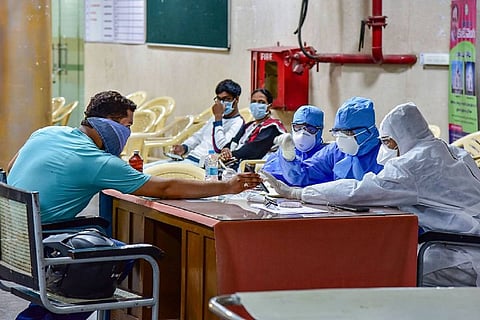

The growing monetary concerns among people in India, at a time when the country’s economy is on the brink of recession, is not unfounded, as many employers have imposed cuts on salaries and benefits. With the number of cases of coronavirus rising exponentially in India, horrifying stories of lack of availability of beds, exorbitant charges levied by private hospitals to treat COVID-19 patients, have emerged.
At a time like this, the need for a health insurance policy to cover medical costs takes prime importance. According to the Asia Insurance Review, less than 4% of COVID-19 patients in India have health insurance coverage, which is not surprising given that insurance coverage in India overall is very low.
However, for many people, who do have a health insurance policy, there is uncertainty on whether it covers costs incurred due to COVID-19 treatment.
In April this year, the Insurance Regulatory Authority of India (IRDAI) mandated that all health insurance products covering treatment costs of hospitalization, offered by all general and health insurance companies, should cover the costs of hospitalization treatment for COVID-19 as well.
A health insurance policy generally covers all hospitalisation expenses incurred by the person insured for all ailments, except any critical ones that are not part of the policy. However, after the IRDAI’s circular, even those who have a general health insurance policy (taken up individually, or offered by your employer), you will be able to claim insurance for COVID-19 treatment as well.
Most health insurance companies have also published this information on their respective websites.
What would your health insurance policy cover?
Existing health insurance policies will cover hospitalisation costs, if the person has been hospitalised for more than 24 hours after being diagnosed with COVID-19. Several insurance providers have said that the policy would cover expenses incurred for pre-hospitalisation care, diagnostics, consultation coverage if the insured person tests positive from a registered medical practitioner, quarantine-related expenses mostly for isolated patients, and only at registered centres, will also be covered. This may include ICU charges, depending on your insurance cover.
And all expenses are settled based on the terms and conditions of the policy. It is therefore recommended to contact your insurer and clarify how much of room and bed charges are covered under your policy.
What is not covered?
If you buy an insurance policy after you are tested positive for the novel coronavirus, you will not be able to claim any benefits.
Home quarantine costs are not covered and under most policies. Travellers, who have to undergo mandatory institutional quarantine before being tested, will also not be able to avail insurance. However, only if a person in institutional quarantine, who tests positive can avail insurance benefits.
In many cases, if a person raises a claim for treatment within the prescribed “waiting period”, they will not be able to avail insurance benefits. Waiting period is the first 30-90 days from the date of purchase of a health insurance policy. A person cannot claim benefits of the policy for COVID-19 treatment, if they are in the waiting period. The waiting period varies depending on the insurance policy, with the minimum being 30 days.
Also, if you have a health insurance policy for a specific illness like cancer, heart ailments, critical illness cover, etc, they do not offer a cover for COVID-19 treatment. Read the terms and conditions of your policy to know what instances and scenarios are covered and what aren’t.
No health insurance cover?
If you do not have a health insurance cover, experts recommend that you get one at the earliest, also taking into account the waiting period.
The Ministry of Home Affairs has made it mandatory for all employers to provide health insurance to its employees as and when they resume operations. It also asked all insurance companies to offer comprehensive health insurance policies either to individuals or groups to make it easier for companies to comply with the Centre’s directives.
In fact, the IRDAI too, will soon mandate all general and health insurance companies to offer a standalone ‘standard COVID-19 health insurance policy’ that would address the insurance needs of people with respect to COVID-19.
This COVID-19 cover is a draft offer at the moment, but IRDAI has told all insurers to offer this individual cover by June 15. IRDAI will soon issue new guidelines for insurance products that specifically cover COVID-19.
As per the draft guidelines, the features of the COVID-specific insurance policy would have to come with a minimum sum insured of Rs 50,000 and a maximum sum insured of Rs 5 lakh.
The policy covers hospitalisation costs, which includes room, nursing expenses, fees of the surgeon, anaesthetist, consultants and specialists if any. It also covers operation theatre charges, blood, oxygen, medicines, anaesthesia and surgical appliances charges as well.
The policy would cover room and nursing charges of up to 2% of the total sum insured and is capped at Rs 5,000 a day. It also covers quarantine charges of up to Rs 3,000 a day and ICU charges at Rs 10,000 per day.
The insurance policy would have a minimum age entry of 18 years and a maximum of 65 years and can be taken for an individual or family. The tenure of the policy would be one year.
It also offers two add-ons: Quarantine cover, and hospital daily cash cover, which is a fixed amount of cash for each day of hospitalisation.
According to experts, a COVID-19-specific cover is beneficial for those who may not have a health insurance cover policy, and are looking for a cost-effective cover in the current scenario as they cannot afford a comprehensive health insurance policy.
However, if you are looking for health insurance cover, experts recommend going for a comprehensive policy that covers not just COVID-19.